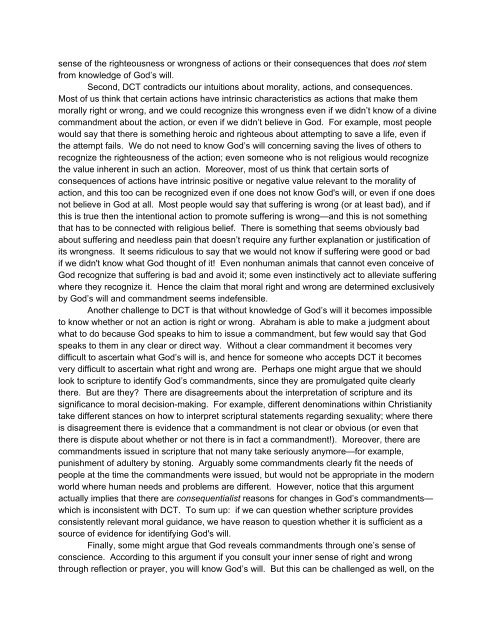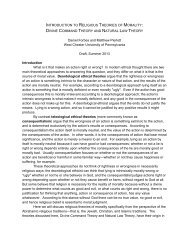Introduction to Religious Theories of Morality
You also want an ePaper? Increase the reach of your titles
YUMPU automatically turns print PDFs into web optimized ePapers that Google loves.
sense <strong>of</strong> the righteousness or wrongness <strong>of</strong> actions or their consequences that does not stem<br />
from knowledge <strong>of</strong> God’s will.<br />
Second, DCT contradicts our intuitions about morality, actions, and consequences.<br />
Most <strong>of</strong> us think that certain actions have intrinsic characteristics as actions that make them<br />
morally right or wrong, and we could recognize this wrongness even if we didn’t know <strong>of</strong> a divine<br />
commandment about the action, or even if we didn’t believe in God. For example, most people<br />
would say that there is something heroic and righteous about attempting <strong>to</strong> save a life, even if<br />
the attempt fails. We do not need <strong>to</strong> know God’s will concerning saving the lives <strong>of</strong> others <strong>to</strong><br />
recognize the righteousness <strong>of</strong> the action; even someone who is not religious would recognize<br />
the value inherent in such an action. Moreover, most <strong>of</strong> us think that certain sorts <strong>of</strong><br />
consequences <strong>of</strong> actions have intrinsic positive or negative value relevant <strong>to</strong> the morality <strong>of</strong><br />
action, and this <strong>to</strong>o can be recognized even if one does not know God's will, or even if one does<br />
not believe in God at all. Most people would say that suffering is wrong (or at least bad), and if<br />
this is true then the intentional action <strong>to</strong> promote suffering is wrong—and this is not something<br />
that has <strong>to</strong> be connected with religious belief. There is something that seems obviously bad<br />
about suffering and needless pain that doesn’t require any further explanation or justification <strong>of</strong><br />
its wrongness. It seems ridiculous <strong>to</strong> say that we would not know if suffering were good or bad<br />
if we didn't know what God thought <strong>of</strong> it! Even nonhuman animals that cannot even conceive <strong>of</strong><br />
God recognize that suffering is bad and avoid it; some even instinctively act <strong>to</strong> alleviate suffering<br />
where they recognize it. Hence the claim that moral right and wrong are determined exclusively<br />
by God’s will and commandment seems indefensible.<br />
Another challenge <strong>to</strong> DCT is that without knowledge <strong>of</strong> God’s will it becomes impossible<br />
<strong>to</strong> know whether or not an action is right or wrong. Abraham is able <strong>to</strong> make a judgment about<br />
what <strong>to</strong> do because God speaks <strong>to</strong> him <strong>to</strong> issue a commandment, but few would say that God<br />
speaks <strong>to</strong> them in any clear or direct way. Without a clear commandment it becomes very<br />
difficult <strong>to</strong> ascertain what God’s will is, and hence for someone who accepts DCT it becomes<br />
very difficult <strong>to</strong> ascertain what right and wrong are. Perhaps one might argue that we should<br />
look <strong>to</strong> scripture <strong>to</strong> identify God’s commandments, since they are promulgated quite clearly<br />
there. But are they? There are disagreements about the interpretation <strong>of</strong> scripture and its<br />
significance <strong>to</strong> moral decision-making. For example, different denominations within Christianity<br />
take different stances on how <strong>to</strong> interpret scriptural statements regarding sexuality; where there<br />
is disagreement there is evidence that a commandment is not clear or obvious (or even that<br />
there is dispute about whether or not there is in fact a commandment!). Moreover, there are<br />
commandments issued in scripture that not many take seriously anymore—for example,<br />
punishment <strong>of</strong> adultery by s<strong>to</strong>ning. Arguably some commandments clearly fit the needs <strong>of</strong><br />
people at the time the commandments were issued, but would not be appropriate in the modern<br />
world where human needs and problems are different. However, notice that this argument<br />
actually implies that there are consequentialist reasons for changes in God’s commandments—<br />
which is inconsistent with DCT. To sum up: if we can question whether scripture provides<br />
consistently relevant moral guidance, we have reason <strong>to</strong> question whether it is sufficient as a<br />
source <strong>of</strong> evidence for identifying God's will.<br />
Finally, some might argue that God reveals commandments through one’s sense <strong>of</strong><br />
conscience. According <strong>to</strong> this argument if you consult your inner sense <strong>of</strong> right and wrong<br />
through reflection or prayer, you will know God’s will. But this can be challenged as well, on the



